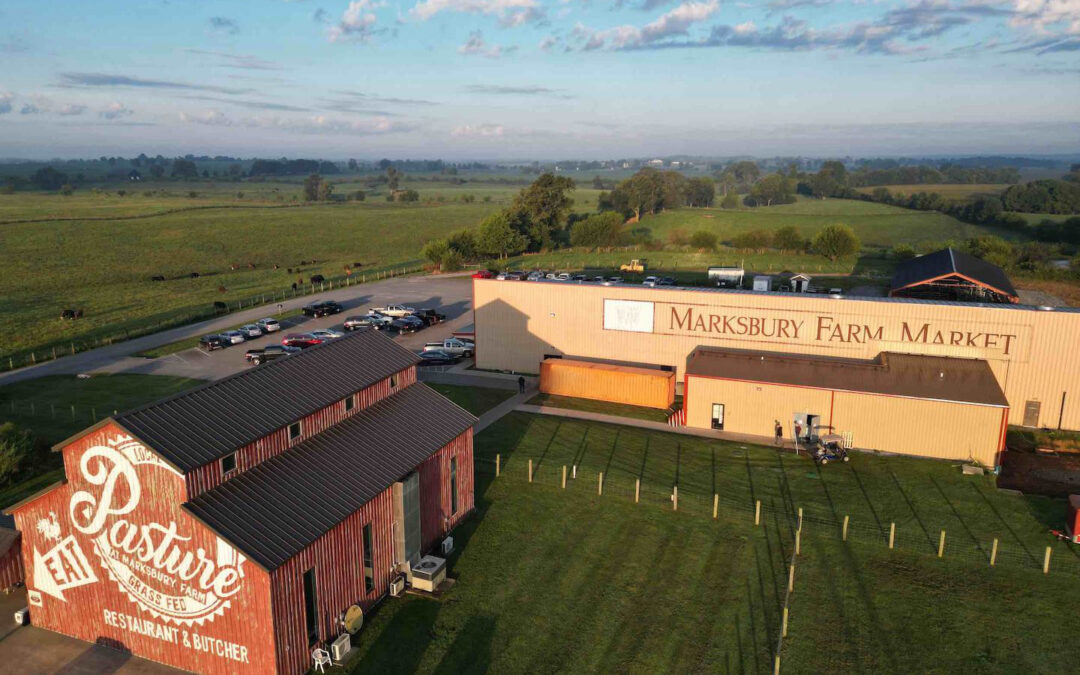Marksbury Farm Market opened its facility for business in August 2010 in the Marksbury community of Garrard County, Kentucky, near the towns of Lancaster and Danville. Our modern 12,000-square foot humane harvesting and processing facility is inspected daily by the USDA-Food Safety Inspection Service and designed to process multiple animal species, currently beef cattle and hogs. We are conveniently located on US 27, a four-lane highway in northern Garrard County that offers logistical and distribution advantages to both our processing and wholesale customers. Our campus also includes our restaurant and retail shop, Pasture Burgers and BBQ, and a meeting facility for small groups.
The company grew largely out of the direct marketing experience of partner Preston Correll, who had spent several years selling meat directly to customers of St. Asaph Farm, the Lincoln County, Kentucky farmstead founded by Preston and his wife Rachel. As Preston began to contemplate increasing his scale of production, he enlisted the support of future partners, Greg Correll, John-Mark Hack and Richard McAlister. After visiting several comparable facilities across the country, ground was broken in 2009 and construction completed in the summer of 2010.
An Appropriate Scale of production
One of our biggest competitive advantages at Marksbury is our relatively small scale of production. As a relatively small-scale processor, we handle each and every animal entrusted to us as if it was our own. Our smaller scale also enables us to attain artisan-level quality in our cutting and processing. Our smaller facility also enables a high degree of cleanliness and sanitation. Unlike most of our industrial scale competitors, we want people to come and visit us to learn what a small scale of production enables.
On the other hand, our facility is large enough to meet the volume requirements of larger commercial customers like Whole Foods Market and many restaurants. Finding the balance between small-scale production and commerical viability is what we define as “An Appropriate Scale of Production.” Our facility is equipped with the most modern processing equipment we could find, providing us and our customers assurances in the critically important areas of food quality, food safety, employee well-being and animal welfare.
Animal Welfare
In designing our facility, we became students of the writings of Temple Grandin, an American professor of animal science at Colorado State University, best-selling author, autism activist and consultant to the livestock industry on animal behavior.
It turns out that animal welfare is critically important on two levels. First, respecting the dignity of all creatures is the right thing to do, and it starts at their birth on our farms. They, like us, are products of God’s Creation, their care and quality of life fully entrusted to us as stewards. Secondly, it turns out that minimizing the stress and anxiety that animals experience has a direct impact on the quality of the meat they provide us.
Temple Grandin showed us way back in 1980 that pre-slaughter stress, such as fighting, cold weather, fasting and transit, all of which occurs in the 12 to 48 hour period prior to slaughter, depletes muscle glycogen and results in meat that has a higher pH, a darker color and is drier. Short-term acute stress, like excitement or fighting immediately prior to slaughter, produces lactic acid from the breakdown of glycogen, resulting in meat that has a lower pH, a lighter color, reduced water binding capacity and is possibly tougher.
Our efforts to provide the highest possible quality of life to the animals entrusted to us begin at their birth and last throughout their entire lives. Within our pasture-based production systems, animals are essential to the natural balance that determines the sustainability of farming.
Our animal holding facilities (photo) are engineered to provide maximum safety and comfort to the cows, hogs and lambs during their brief stay there. We followed Temple Grandin’s recommendations in making our choices of materials, shape, and animal flow patterns.
Farmer Convenience
A key element in managing the health and welfare of our animals is the ease of delivery to our facility. We designed our animal delivery areas to be as easy and convenient as possible for the farmers bringing their animals to us. Helping to alleviate stress felt by farmers reduces stress felt by animals.


